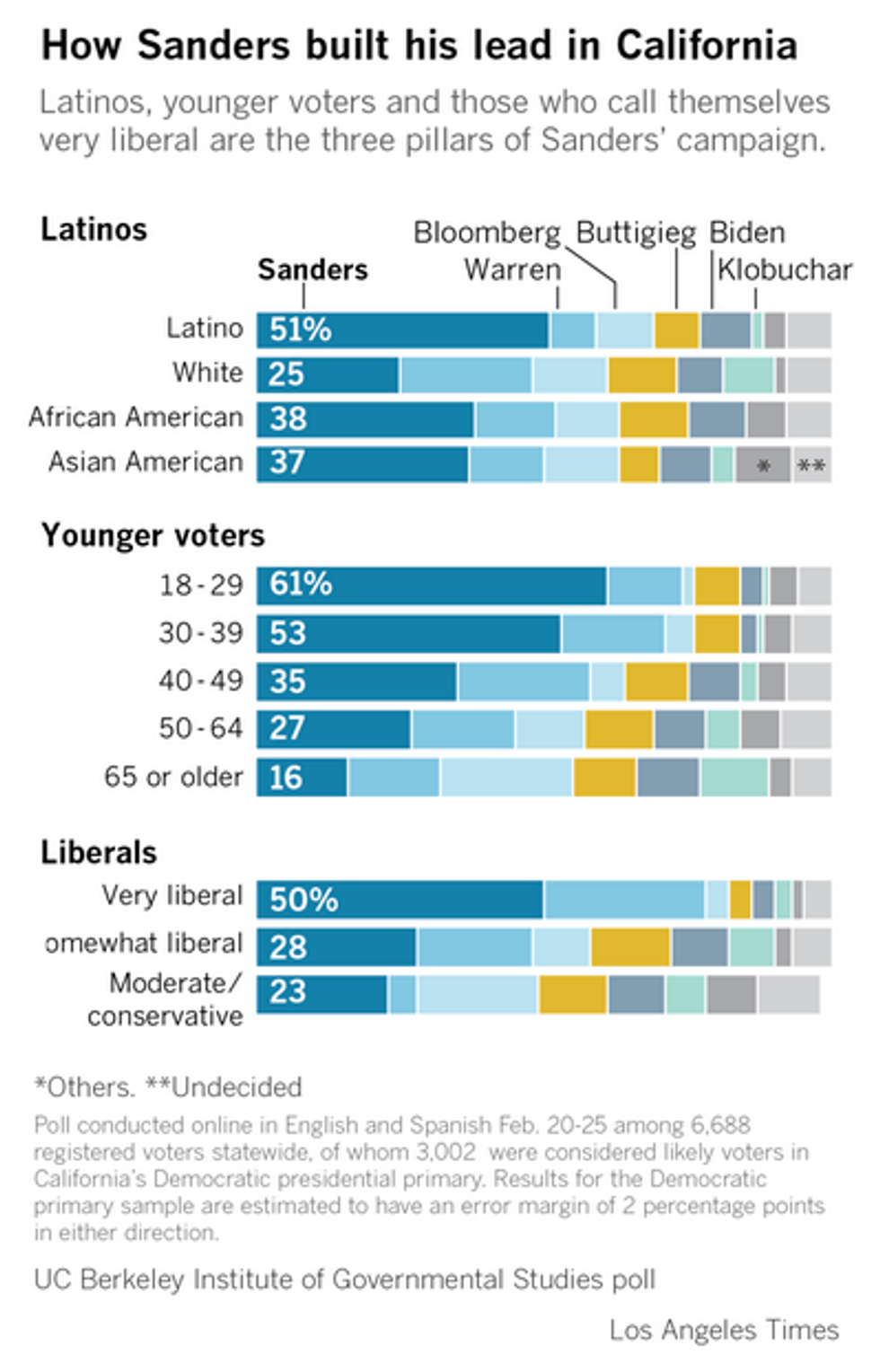

SUBSCRIBE TO OUR FREE NEWSLETTER
Daily news & progressive opinion—funded by the people, not the corporations—delivered straight to your inbox.
5
#000000
#FFFFFF
To donate by check, phone, or other method, see our More Ways to Give page.


Daily news & progressive opinion—funded by the people, not the corporations—delivered straight to your inbox.

Democratic presidential candidate Sen. Bernie Sanders (I-Vt.) speaks during a rally at Valley High School in Santa Ana, California on February 21, 2020. (Photo: Ringo Chiu/AFP via Getty Images)
Sen. Bernie Sanders is leading his Democratic presidential opponents by a formidable 17 percentage points in California and is on track to win more than half of the state's 415 pledged delegates in the March 3 primary contest.
That's according to a Los Angeles Times/U.C. Berkeley poll released Friday, just four days ahead of Super Tuesday. The survey showed Sanders at the top of the Democratic field with 34% support, a two-to-one lead over Sen. Elizabeth Warren (D-Mass.), who polled in a distant second at 17%.
Billionaire businessman Michael Bloomberg placed in third at 12%, followed by Pete Buttigieg at 11% and former Vice President Joe Biden at 8%.
The poll was based on a survey of 3,002 likely Democratic primary voters and has a margin of error of plus or minus 2 percentage points.
"The Vermont senator's dominance in California could have a major impact on the overall race for the nomination," the Times reported. "Based on his 34% support in the poll, this state alone likely will give him well over 10% of the 1,991 delegates he would need to win the nomination at the national convention this summer."
\u201cThe Democratic primary race in California has grown really stark. If this latest poll holds, Sanders would win over 10% of the delegates he needs to clinch the nomination. https://t.co/epLUiNdY3g\u201d— Matt Pearce \ud83e\udd85 (@Matt Pearce \ud83e\udd85) 1582899217
Former Vice President Joe Biden and Sen. Amy Klobuchar (D-Minn.) face the possibility of not winning a single delegate in the California primary, according to the poll.
"The primary will distribute 415 delegates, but only to candidates who win at least 15% of the vote either statewide or in a congressional district," the Times noted. "Sanders and Warren are the only candidates to hit that mark statewide, the poll finds; if that holds, they would split 144 delegates distributed statewide, with Sanders getting about two-thirds of them. They would also be in position to compete for most of the 271 delegates distributed by congressional district."
Sanders could reach the 15% threshold in all 53 of the state's congressional districts, the survey found.
The senator has overwhelming statewide support among likely Latino voters--who make up around a quarter of the California primary electorate--and voters between the ages of 18 and 29.

"A month ago, our poll showed Sanders with an outright lead in California," Mark DiCamillo, director of the Berkeley Institute of Governmental Studies, said in a statement. "Our latest shows that he's been effective in consolidating that in the homestretch, while support for his rivals has become even more dispersed."
"The net effect," added DiCamillo, "could provide Sanders with a huge payday from the state on Super Tuesday."
Dear Common Dreams reader, The U.S. is on a fast track to authoritarianism like nothing I've ever seen. Meanwhile, corporate news outlets are utterly capitulating to Trump, twisting their coverage to avoid drawing his ire while lining up to stuff cash in his pockets. That's why I believe that Common Dreams is doing the best and most consequential reporting that we've ever done. Our small but mighty team is a progressive reporting powerhouse, covering the news every day that the corporate media never will. Our mission has always been simple: To inform. To inspire. And to ignite change for the common good. Now here's the key piece that I want all our readers to understand: None of this would be possible without your financial support. That's not just some fundraising cliche. It's the absolute and literal truth. We don't accept corporate advertising and never will. We don't have a paywall because we don't think people should be blocked from critical news based on their ability to pay. Everything we do is funded by the donations of readers like you. Will you donate now to help power the nonprofit, independent reporting of Common Dreams? Thank you for being a vital member of our community. Together, we can keep independent journalism alive when it’s needed most. - Craig Brown, Co-founder |
Sen. Bernie Sanders is leading his Democratic presidential opponents by a formidable 17 percentage points in California and is on track to win more than half of the state's 415 pledged delegates in the March 3 primary contest.
That's according to a Los Angeles Times/U.C. Berkeley poll released Friday, just four days ahead of Super Tuesday. The survey showed Sanders at the top of the Democratic field with 34% support, a two-to-one lead over Sen. Elizabeth Warren (D-Mass.), who polled in a distant second at 17%.
Billionaire businessman Michael Bloomberg placed in third at 12%, followed by Pete Buttigieg at 11% and former Vice President Joe Biden at 8%.
The poll was based on a survey of 3,002 likely Democratic primary voters and has a margin of error of plus or minus 2 percentage points.
"The Vermont senator's dominance in California could have a major impact on the overall race for the nomination," the Times reported. "Based on his 34% support in the poll, this state alone likely will give him well over 10% of the 1,991 delegates he would need to win the nomination at the national convention this summer."
\u201cThe Democratic primary race in California has grown really stark. If this latest poll holds, Sanders would win over 10% of the delegates he needs to clinch the nomination. https://t.co/epLUiNdY3g\u201d— Matt Pearce \ud83e\udd85 (@Matt Pearce \ud83e\udd85) 1582899217
Former Vice President Joe Biden and Sen. Amy Klobuchar (D-Minn.) face the possibility of not winning a single delegate in the California primary, according to the poll.
"The primary will distribute 415 delegates, but only to candidates who win at least 15% of the vote either statewide or in a congressional district," the Times noted. "Sanders and Warren are the only candidates to hit that mark statewide, the poll finds; if that holds, they would split 144 delegates distributed statewide, with Sanders getting about two-thirds of them. They would also be in position to compete for most of the 271 delegates distributed by congressional district."
Sanders could reach the 15% threshold in all 53 of the state's congressional districts, the survey found.
The senator has overwhelming statewide support among likely Latino voters--who make up around a quarter of the California primary electorate--and voters between the ages of 18 and 29.

"A month ago, our poll showed Sanders with an outright lead in California," Mark DiCamillo, director of the Berkeley Institute of Governmental Studies, said in a statement. "Our latest shows that he's been effective in consolidating that in the homestretch, while support for his rivals has become even more dispersed."
"The net effect," added DiCamillo, "could provide Sanders with a huge payday from the state on Super Tuesday."
Sen. Bernie Sanders is leading his Democratic presidential opponents by a formidable 17 percentage points in California and is on track to win more than half of the state's 415 pledged delegates in the March 3 primary contest.
That's according to a Los Angeles Times/U.C. Berkeley poll released Friday, just four days ahead of Super Tuesday. The survey showed Sanders at the top of the Democratic field with 34% support, a two-to-one lead over Sen. Elizabeth Warren (D-Mass.), who polled in a distant second at 17%.
Billionaire businessman Michael Bloomberg placed in third at 12%, followed by Pete Buttigieg at 11% and former Vice President Joe Biden at 8%.
The poll was based on a survey of 3,002 likely Democratic primary voters and has a margin of error of plus or minus 2 percentage points.
"The Vermont senator's dominance in California could have a major impact on the overall race for the nomination," the Times reported. "Based on his 34% support in the poll, this state alone likely will give him well over 10% of the 1,991 delegates he would need to win the nomination at the national convention this summer."
\u201cThe Democratic primary race in California has grown really stark. If this latest poll holds, Sanders would win over 10% of the delegates he needs to clinch the nomination. https://t.co/epLUiNdY3g\u201d— Matt Pearce \ud83e\udd85 (@Matt Pearce \ud83e\udd85) 1582899217
Former Vice President Joe Biden and Sen. Amy Klobuchar (D-Minn.) face the possibility of not winning a single delegate in the California primary, according to the poll.
"The primary will distribute 415 delegates, but only to candidates who win at least 15% of the vote either statewide or in a congressional district," the Times noted. "Sanders and Warren are the only candidates to hit that mark statewide, the poll finds; if that holds, they would split 144 delegates distributed statewide, with Sanders getting about two-thirds of them. They would also be in position to compete for most of the 271 delegates distributed by congressional district."
Sanders could reach the 15% threshold in all 53 of the state's congressional districts, the survey found.
The senator has overwhelming statewide support among likely Latino voters--who make up around a quarter of the California primary electorate--and voters between the ages of 18 and 29.

"A month ago, our poll showed Sanders with an outright lead in California," Mark DiCamillo, director of the Berkeley Institute of Governmental Studies, said in a statement. "Our latest shows that he's been effective in consolidating that in the homestretch, while support for his rivals has become even more dispersed."
"The net effect," added DiCamillo, "could provide Sanders with a huge payday from the state on Super Tuesday."